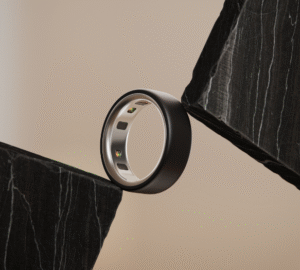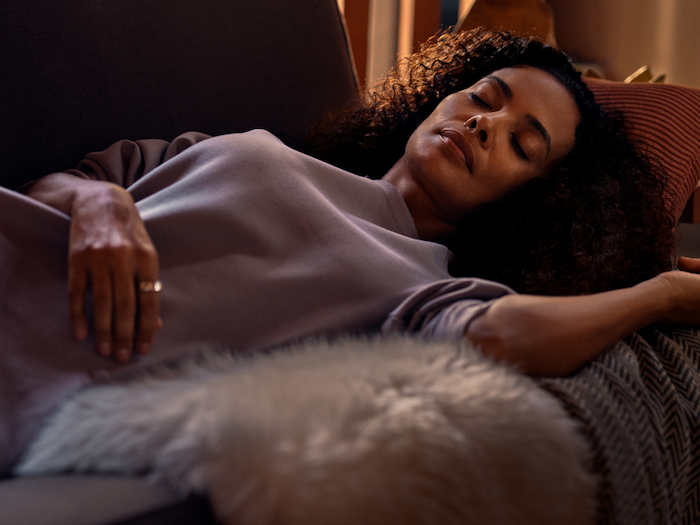Each night, you take a rollercoaster ride through the different stages of sleep. Though you’re unaware of what goes on while you’re snoozing, your brain and body are in an active state.
Each stage of sleep plays a different role in how you feel the next day. Read on to learn which stage helps your brain, which restores your body, and if you’re striking a good balance between the stages each night.
What Are the 4 Stages of Sleep?
There are traditionally 4 types of sleep: awake, light, deep, and REM sleep. Each one plays an essential role in maintaining your mental and physical health.
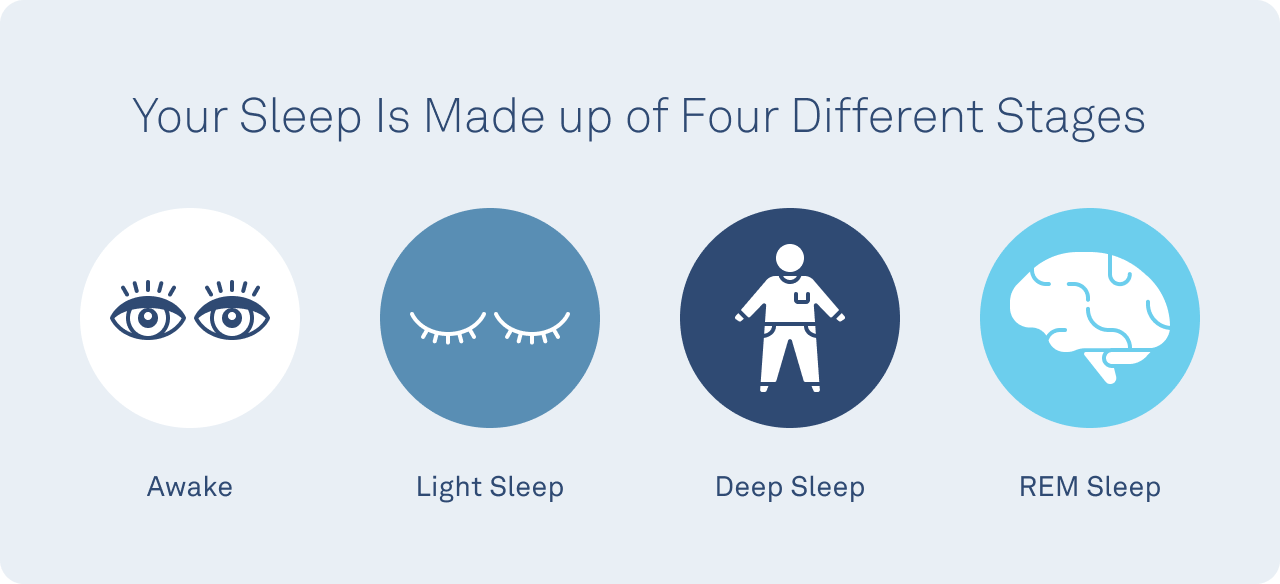
As you’re reading about sleep, you may also see the terms “NREM” or “NREM Stages 1-4.” These are simply other terms for the phases of sleep.
- REM sleep stands for “rapid eye movement” and can also be called “stage R”
- NREM (or non-rapid eye movement) sleep includes light and deep sleep stages, and may also be referred to NREM stages 1-4, with light sleep being NREM stages 1-2 and deep sleep encompassing NREM stages 3-4
What Happens in Each Stage of Sleep?
Each stage of sleep plays a different role in preparing your body for the next day.
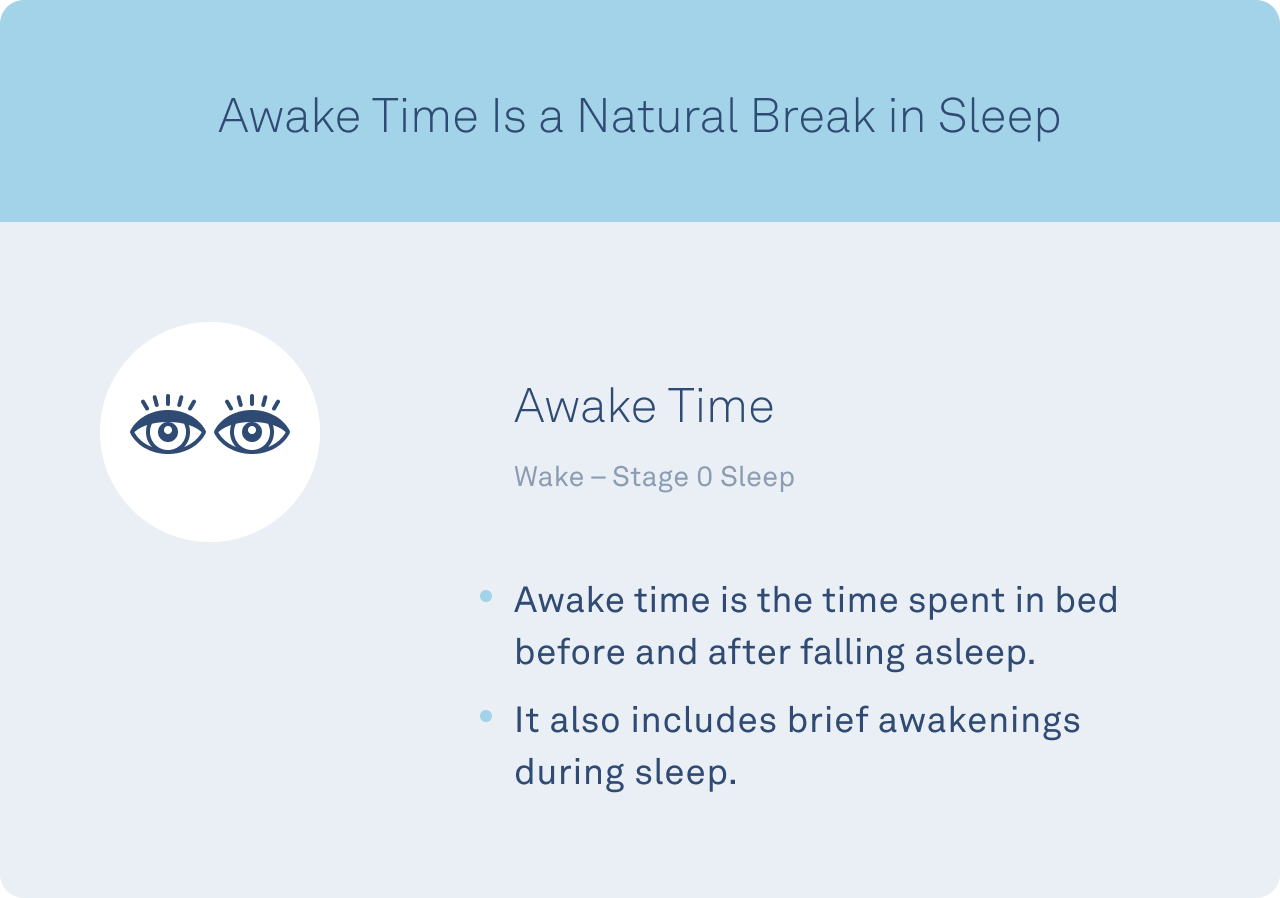
Why Awake Time Matters
It’s normal to wake up sometimes during the night, whether or not you’re conscious of being awakened.
| Member Tip: In the Oura App, you’ll see your amount of Awake Time shown in your Sleep tab. The nighttime Movement graph also gives you an idea of how many times you wake up during the night (find it by tapping the arrow just below Sleep Stages to expand this view). A tall, white line indicates excessive movement, suggesting you were likely awake. |
If you feel refreshed in the morning and energetic during the day, you most likely don’t need to worry about your wake-ups or movement during the night. However, if you’re feeling fatigued, it could be an indication of something that’s affecting your sleep quality, or an untreated sleep disorder like sleep apnea.
If you’re seeing lots of awake time, another indicator to check is your Blood Oxygen Levels and your Breathing Regularity score — learn more about these metrics here.
READ MORE: Restless Sleep? How to Reduce Tossing and Turning at Night
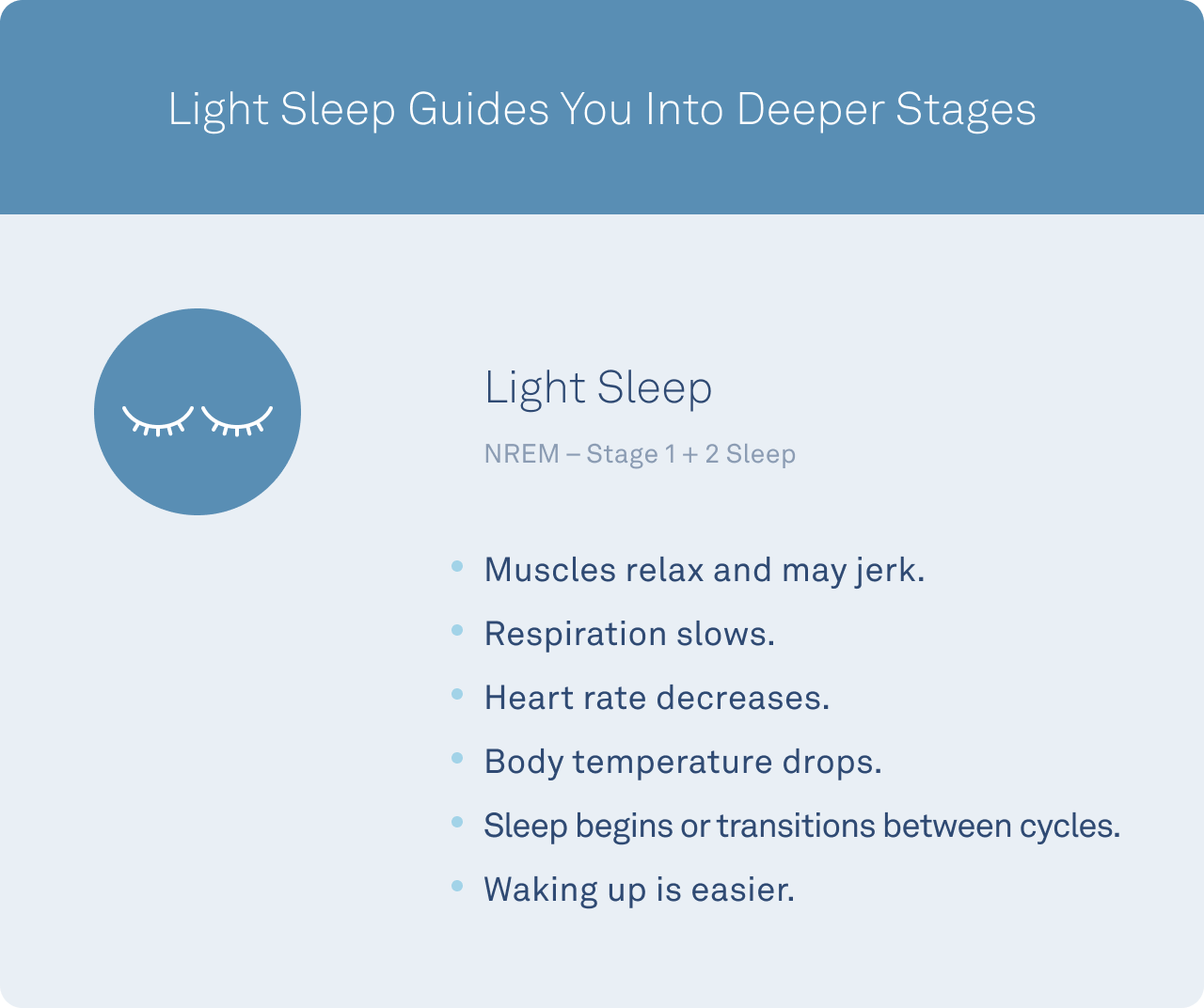
Why Light Sleep Matters
Despite its name, light sleep is no lightweight when it comes to your health. It’s a key stage of sleep that delivers benefits to your brain and body, including codifying memories and boosting creativity. And that’s nothing to sleep on, given that about half of your time asleep — about 50% — is spent in this stage.
Light sleep actually occurs in two stages: NREM stages 1 and 2 sleep. Think of NREM stage 1 as “falling asleep.” During this time, your muscles relax, your heart begins to slow down, and your body temperature dips. Your brain waves slow down, moving from a regular, rhythmic pattern to one with less frequent, less regular waves. Stage 1 sleep usually only lasts a few minutes.
NREM stage 2 sleep makes up the bulk of your NREM sleep. During this stage of sleep, your muscles relax, and may jerk. Your respiration and heart rate slow down, your body temperature drops, and your brain waves also slow down and increase in amplitude.
READ MORE: Light Sleep: What Is It and What Are the Benefits?
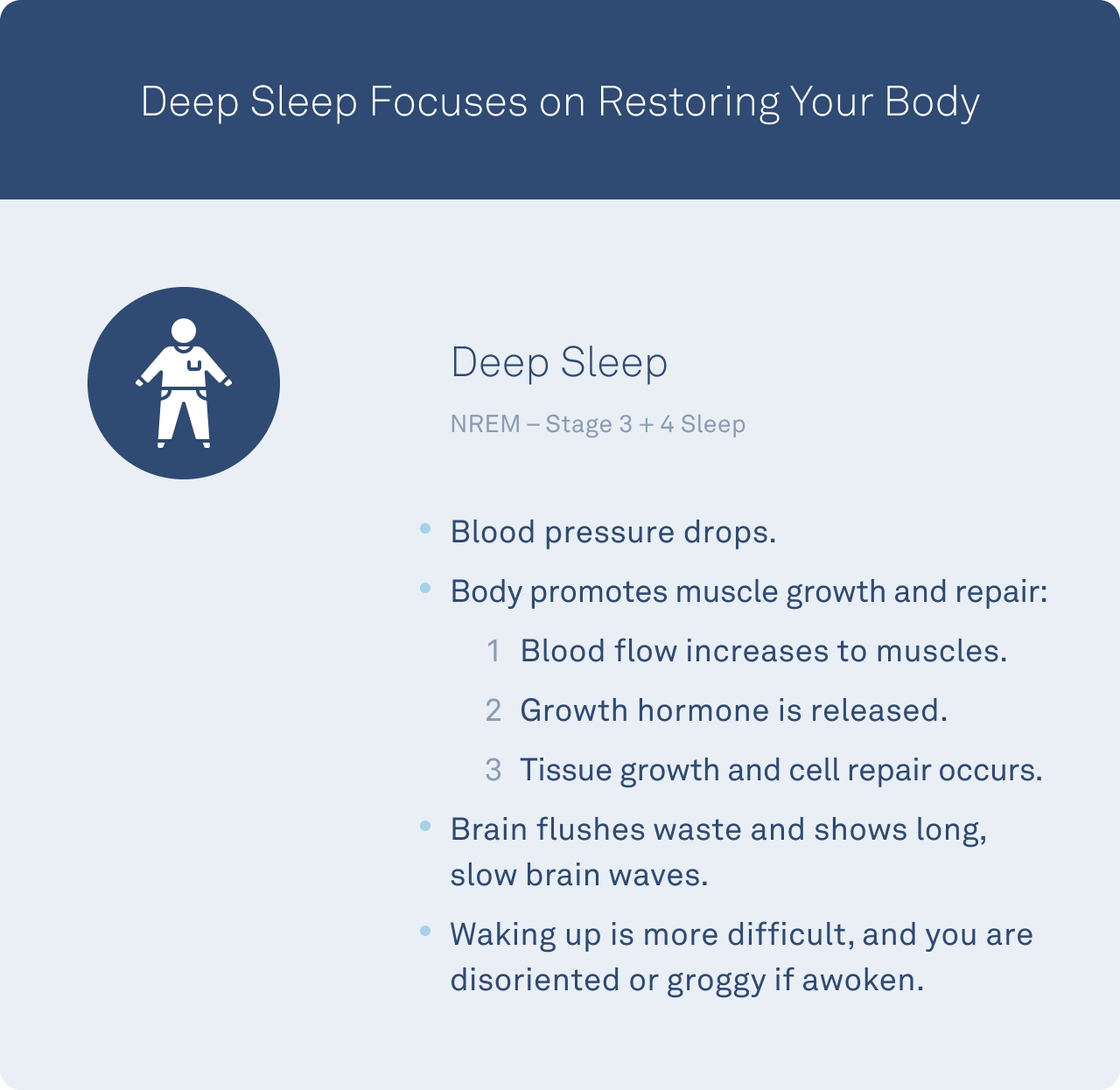
Why Deep Sleep Matters
Deep sleep, also known as slow-wave sleep, is the body’s most rejuvenating sleep stage. During deep sleep, which occurs in the third NREM (non-rapid eye movement) sleep cycle, your body gets busy repairing and restoring many systems, from your brain to your muscles.
During deep sleep, your body slows way down. Your heart rate and breathing are at their lowest rate, and your muscles are fully relaxed. Your brain’s electrical activity slows down into long, slow waves known as delta waves, hence the name “slow-wave sleep.” It’s difficult to be woken up during this stage — and if you do, you can expect to feel groggy and “out of it.”
Typically, deep sleep occurs within an hour of falling asleep and you usually get more deep sleep during the earlier part of the night.
READ MORE: Deep Sleep: What Is It and How to Get More
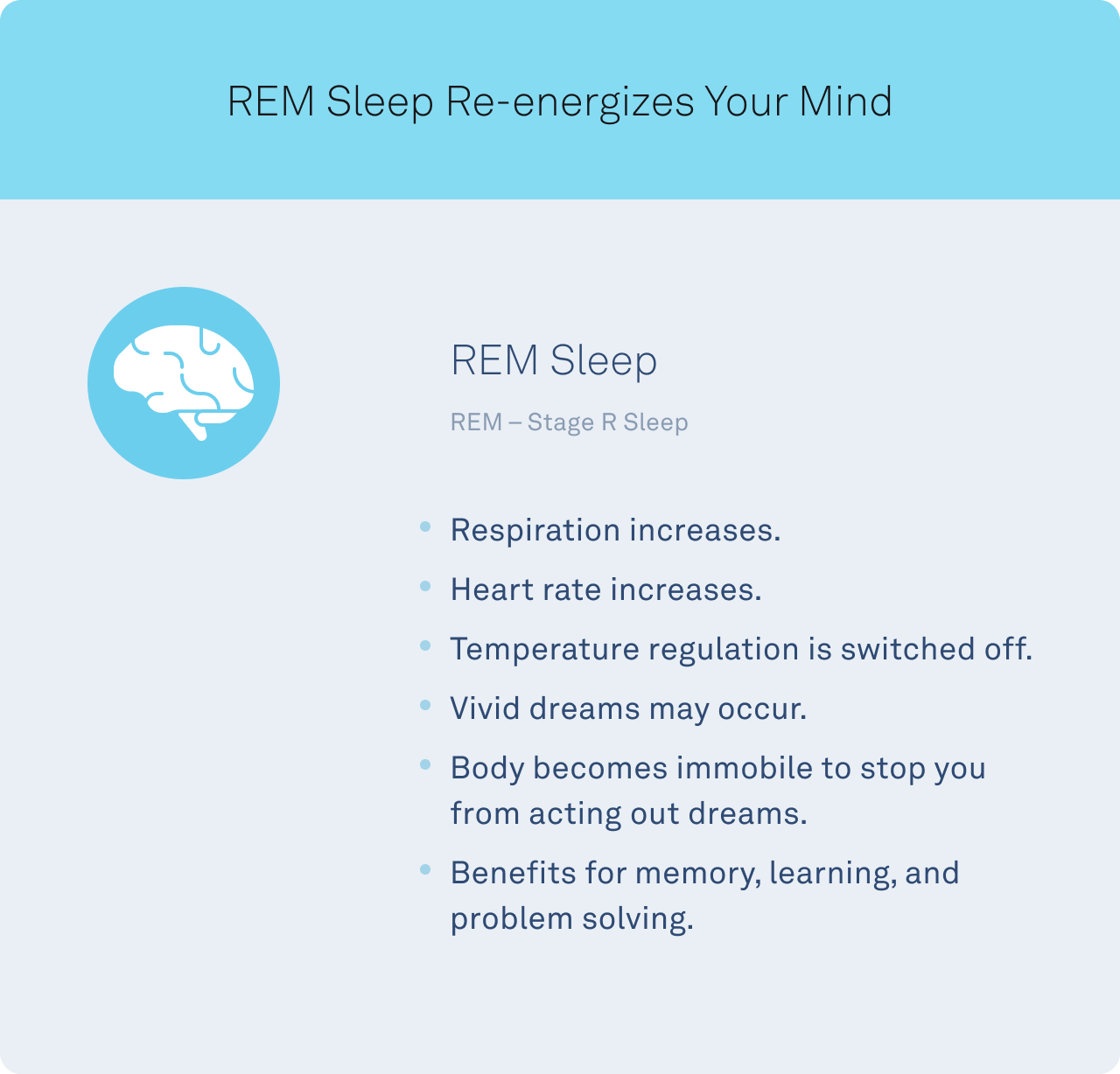
Why REM Sleep Matters
During REM sleep, as the name suggests, your eyes move rapidly behind your closed eyelids, your heart rate speeds up, and breathing becomes irregular. Brain activity also speeds up, mimicking brainwave activity while you’re awake. You may also experience irregular, jerky muscle twitches as you dream, and it tends to be more difficult to wake up during REM sleep. To protect yourself from acting out dreams, your body can also experience a loss of muscle tone during REM.
While it’s no longer true that you only dream during REM sleep, studies suggest that about 80% of vivid dream recall results after arousal from this stage of sleep.
Research has shown that REM plays an incredibly important role in both emotional health and learning. “Essentially, REM is creating a revised mind-wide web of associations,” explains Matthew Walker, Ph.D., author of Why We Sleep. “We make connections during REM sleep.” Furthermore, getting enough REM sleep may help mitigate potentially negative emotional reactions.
READ MORE: REM Sleep: What Is It and How to Get More
| Member Story: Knowing the breakdown of his sleep stages is vital for Oura member Hemang K. who adjusts his work day if he doesn’t get enough REM sleep — understanding the impact of REM sleep on emotional regulation. |
What Does A Normal Night Look Like?
The amount of each of the 4 stages of sleep can vary significantly between nights and individuals. During an ideal night’s sleep, your body has enough time to go through four to five 90-minute cycles that sample different phases of sleep as the night progresses.
In general, each cycle moves sequentially through each of the 4 stages of sleep: wake, light sleep, deep sleep, REM, and repeat. Cycles earlier in the night tend to have more deep sleep while later cycles have a higher proportion of REM. By the final cycle, your body may even choose to skip deep sleep altogether.
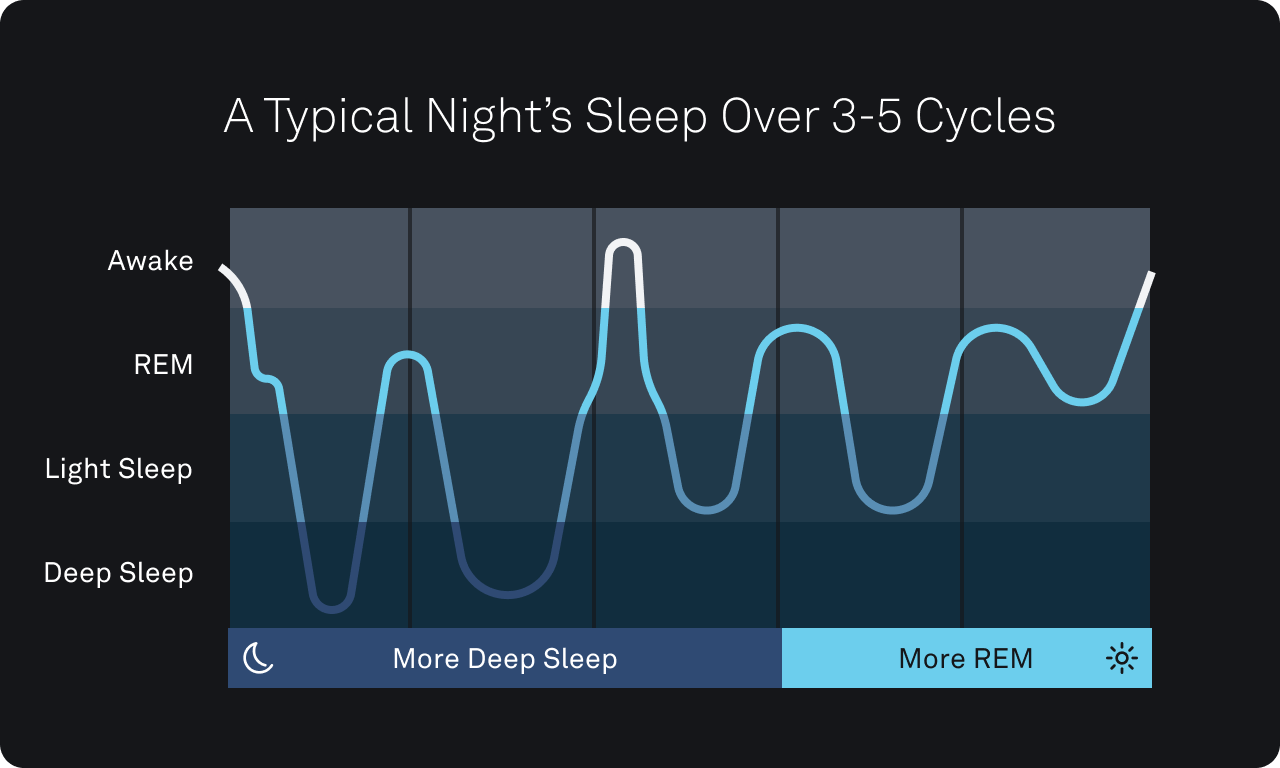
Overall, your body spends the majority of the night in light sleep. How much time you spend in REM or deep can vary widely by individual but below are the averages you can expect for each stage in a single night.
How Much Time Do You Spend in Each of the 4 Stages of Sleep?
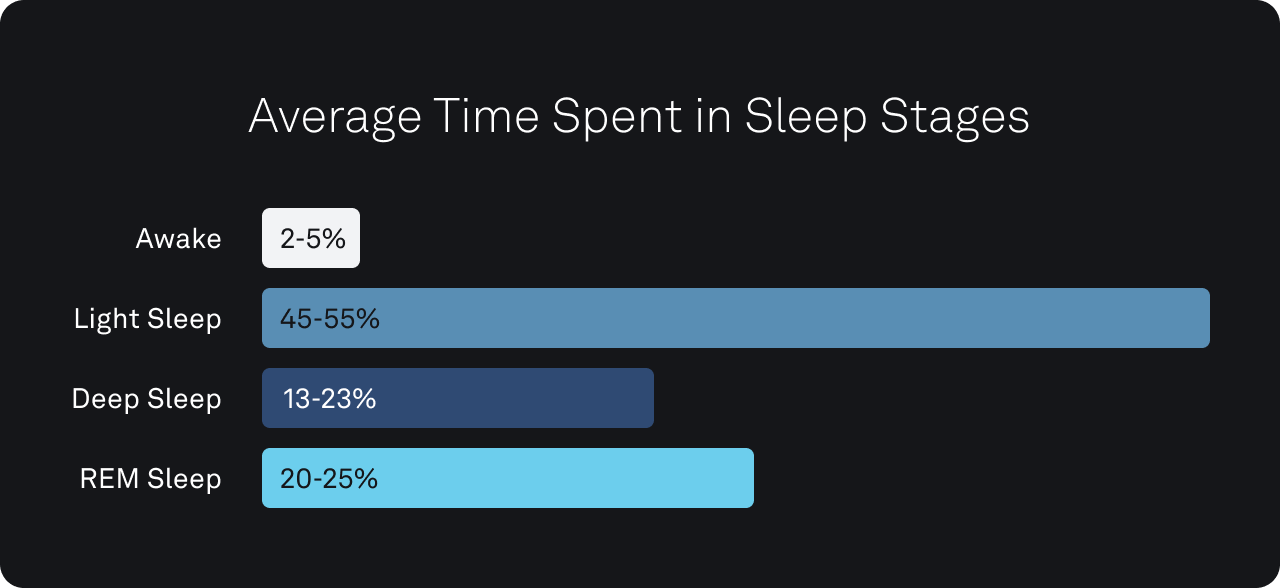
How Accurate is Oura Ring?
Wondering how accurate Oura is at distinguishing between light sleep and REM? Good news: According to recent external validation studies, sleep staging accuracy ranged between 75.5 % (light sleep) and 90.6 % (REM sleep). The Oura Ring had a sensitivity of 94.4 % to 94.5%. In fact, these studies found that Oura Ring did not “significantly differ” from gold standard sleep lab testing (PSG).
The researchers concluded: “Oura has high sensitivity and specificity with almost perfect agreement with PSG for 2-stage sleep classification, and an inter-device reliability of 94.8 %.” That means that Oura is so accurate; it’s like having an entire sleep lab right there at your fingertips.
READ MORE: Oura Accuracy Further Validated by New Study from the University of Tokyo
Common Reasons for Disrupted Sleep Cycles
All stages of sleep are important and your body naturally regulates your sleep cycles to make sure you get what you need. Tools like the Oura Ring can help you monitor your sleep patterns and generate a Sleep Score each night to help you improve your sleep.
Check out these patterns to see if your sleep is being disrupted:
- Increase in deep sleep after a hard workout: Studies show that exercise can increase your body’s prioritization of deep sleep the night after an intensive workout.
- Higher REM rebound after sleep deprivation: When you recover from a period of sleep deprivation, your body prioritizes deep sleep for the first few nights to repair your body and prepare for action. After several nights of sufficient deep sleep, REM sleep rebounds to focus on your brain.
- Interrupted sleep cycles after caffeine: Caffeine can increase the time it takes for you to fall asleep, cutting your sleep period short. Shorter sleep periods disproportionately cut down on your total REM sleep, as REM cycles are more likely to occur in later sleep cycles.
Taking a look at your nightly patterns (e.g. heart rate, body temperature) and acting on your desire to improve your sleep can help you face those days well-rested.
Key Takeaways
There are four main stages of sleep: light sleep, deep sleep, and REM sleep, which are all essential for your mental and physical well-being. Light sleep helps with memory and creativity, while deep sleep is when your body physically repairs itself. REM sleep is critical for emotional health and learning. A good night’s rest means cycling through all these stages to ensure your brain and body are fully restored.
Frequently Asked Questions About Sleep
What are the 4 stages of sleep?
There are four stages of sleep: Awake, Light, Deep, and REM (Rapid Eye Movement). These are also referred to as NREM (Non-Rapid Eye Movement) stages 1, 2, 3, and REM.
What happens in each stage of sleep?
- Awake: It’s normal to have short awake periods throughout the night. If you feel rested, these brief awakenings are not a concern.
- Light Sleep: Making up about half of your total sleep, this stage (NREM stages 1 and 2) is a time of relaxation as your heart rate and body temperature drop. It’s crucial for memory and creativity.
- Deep Sleep: This is the most physically restorative stage (NREM stage 3). Your body repairs and restores itself, with brain activity slowing into “delta waves.” It’s the hardest stage to wake from.
- REM Sleep: Your brain becomes very active, mimicking waking hours. This is when vivid dreaming occurs. REM sleep is vital for emotional health and learning, as your brain makes new connections.
Why do some sleep trackers use “NREM” stages?
NREM is an abbreviation for “non-rapid eye movement” and includes light and deep sleep. NREM stages 1 and 2 are light sleep, while NREM stage 3 is deep sleep. Sleep trackers use this terminology to classify your sleep phases.
What does a normal night of sleep look like?
A typical night involves four to five 90-minute sleep cycles. Each cycle progresses from awake to light, deep, and then REM sleep. Your body gets more deep sleep in the first half of the night, while REM sleep periods get longer in the second half.
RELATED: Why You Shouldn’t Stress About Getting the “Perfect” Night of Sleep








